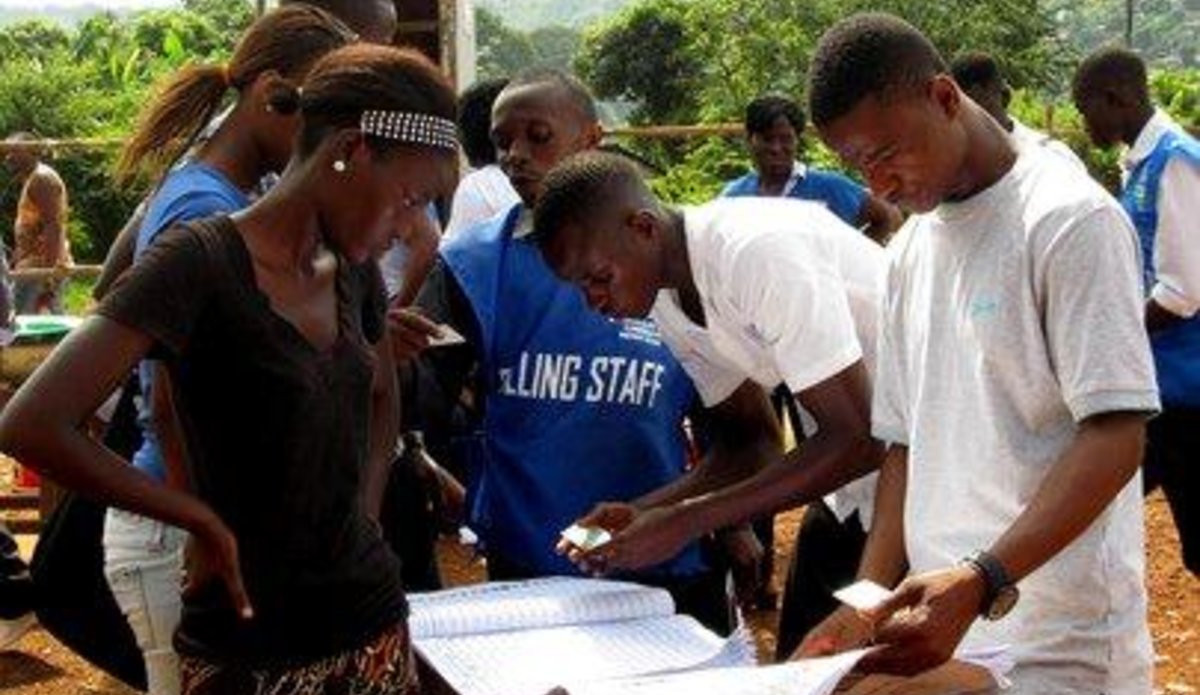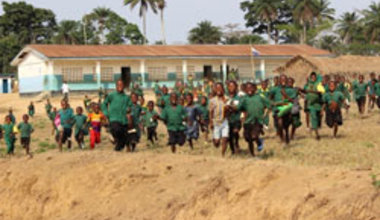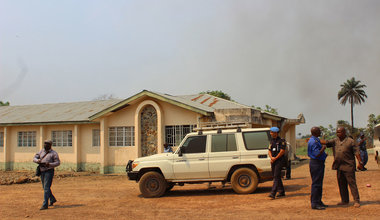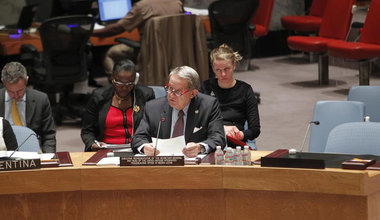Sierra Leone saw many UN “firsts,” says Ban Ki-moon as UNIPSIL completes its mandate
27 March 2014 - The UN Integrated Peacebuilding Office in Sierra Leone (UNIPSIL) completes its Security Council mandate on 31 March 2014 and transfers its responsibility to the UN Country Team, which consists of 19 agencies, funds and programmes, based on the UN Development Assistance Framework, known as UNDAF.
The UN Country team and specialized agencies will carry forward some of UNIPSIL’s residual tasks, including support for the ongoing constitutional review process. The UNDAF will help the Government press ahead with implementation of Sierra Leone’s Agenda for Prosperity, a social and economic development strategy for 2013-2018.
“Sierra Leone represents one of the world’s most successful cases of post-conflict recovery, peacekeeping and peacebuilding,” UN Secretary-General Ban Ki-moon said at the 5 March joint press conference in Freetown alongside Sierra Leonean President Ernest Bai Koroma.
Given the signs of real progress in the country, the United Nations Security Council unanimously agreed last year that UNIPSIL would drawdown as of 31 March 2014.
During its last year, the political mission focused on three main areas: good offices and the facilitation of political dialogue towards a constitutional review process and towards strengthening conflict prevention and resolution processes; security sector support; and strengthening of human rights institutions.
The Secretary-General, in his final report on UNIPSIL submitted to the Security Council on 17 Match 2014, took stock of the overall implementation of the UNIPSIL mandate since the establishment of the mission in 2008 and provided an assessment of the remaining challenges facing Sierra Leone after drawdown on 31 March.
“Sierra Leone has taught the world many lessons, but none more important than the power of people to shape the future,” said Ban Ki-moon at the closing ceremony in Freetown on 5 March.
While celebrating the successful conclusion of the UN Integrated Peacebuilding Office, the Secretary-General said that this was a triumph for the people of Sierra Leone and that the UN was proud to have supported them.
He also noted that Sierra Leone saw many UN “firsts”:
- This country hosted the UN’s first multi-dimensional peacekeeping operation with political, security, humanitarian and national recovery mandates.
- Sierra Leone was home to the first UN Deputy Special Representative who also served as head of UNDP, UN Resident Coordinator and Humanitarian Coordinator – underscoring the links among peace, human rights and development.
- The UN Peacebuilding Commission made its first-ever visit to Sierra Leone.
- This country also had the first Secretary-General’s Executive Representative heading the political and development presence. This ensured an integrated approach to supporting the Government’s peacebuilding efforts.
- The UN Mission in Sierra Leone overcame severe challenges – and successfully brought peace to a nation torn by a decade of war.
- Our blue helmets disarmed more than 75,000 ex-fighters, including hundreds of child soldiers.
- The UN destroyed more than 42,000 weapons and 1.2 million rounds of ammunition – a potentially deadly arsenal that is now itself dead.
- The UN helped the Government to combat illicit diamond mining that fuelled the conflict, and to establish control over the affected areas.
- With the UN’s help, Sierra Leone held its first-ever free and fair elections.
- The UN assisted more than half a million Sierra Leonean refugees and internally displaced persons when they voluntarily returned home.
- We helped train thousands of local police.
- The UN family launched projects that gave jobs to thousands of ex-fighters – and basic services to communities. Our staff built schools and clinics, funded farming projects and provided free medical services.
- The people of Sierra Leone suffered grave human rights abuses – and they became staunch human rights advocates. When victims and perpetrators of atrocities were ready to talk and heal, the UN helped set up the Truth and Reconciliation Commission.
- The United Nations was proud to help set up the Special Court here. This was the first country in Africa to establish, with UN participation, a tribunal on its own territory to address the most serious international crimes.
- When the Special Court closed last year, it was the first of the UN and UN-backed tribunals to successfully complete its mandate.
- The Special Court’s sentencing of former Liberian President Charles Taylor was the first conviction of a former Head of State since Nuremberg. It showed the world that even top leaders must pay for their crimes.
- The trials saw first-ever convictions for attacks against UN peacekeepers, forced marriage as a crime against humanity, and for the use of child soldiers.
- When the peacekeepers left, the UN Integrated Peacebuilding Office helped Sierra Leone’s citizens to consolidate progress. This political mission addressed tensions that could have caused a relapse into conflict, while strengthening institutions and promoting human rights.
- UNIPSIL helped the Government to bolster the National Electoral Committee and the Political Parties Registration Commission. It emphasized dialogue and tolerance.
- The Mission helped the police establish the first Transnational Organized Crime Unit in West Africa – and create an Independent Police Complaints Board.
- UNIPSIL also helped establish the Sierra Leone Broadcasting Corporation.
- It strengthened Sierra Leone’s National Human Rights Commission – which received an award for complying with international standards.
On 26 March 2014, the Security Council, in its Presidential statement, commended “the remarkable achievements” made by Sierra Leone over the past decade as well as its contribution to important regional and global initiatives. It further commended the effectiveness of the approach of the United Nations, international financial institutions, regional and sub-regional bodies and the broader international community to peacebuilding in Sierra Leone.
At the same time, the Council stressed that there was important work ahead to further embed peace and secure equitable prosperity for the benefit of all Sierra Leoneans. The Security Council welcomed the adoption by the Government of Sierra Leone of the Agenda for Prosperity covering the period from 2013 to 2018 and notes the importance of the implementation of this programme in accordance with the Mutual Accountability Framework agreed between the Government of Sierra Leone and Sierra Leone's Development Partners' Committee in March 2013.
The Security Council also stressed the importance for Sierra Leone's long-term stability of ensuring a peaceful, credible and transparent electoral process in 2017 and reiterated its request in resolution 2097 that the United Nations Office for West Africa (UNOWA) makes available its good offices to support the Government of Sierra Leone and the new United Nations Resident Coordinator, as necessary.
 UN
UN





